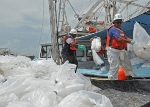
DOJ Sues BP, Transocean, Seven Others in Deepwater Horizon Case
BP, Anadarko, MOEX, Triton, Transocean and QBE companies face Oil Pollution Act and Clean Water Act claims in the civil lawsuit.
Nine defendant companies are named in the U.S. Department of Justice's civil lawsuit over the Deepwater Horizon disaster, U.S. Attorney General Eric Holder announced Dec. 15. The lawsuit seeks civil penalties under the Clean Water Act and asks the court to declare eight of the defendants liable without limitation under the Oil Pollution Act for all removal costs and damages caused by the oil spill, including damages to natural resources.
The defendants are:
- BP Exploration and Production Inc.
- Anadarko Exploration & Production LP
- Anadarko Petroleum Corporation
- MOEX Offshore 2007 LLC
- Triton Asset Leasing GMBH
- Transocean Holdings LLC
- Transocean Offshore Deepwater Drilling Inc.
- Transocean Deepwater Inc.
- QBE Underwriting Ltd./Lloyd’s Syndicate 1036
QBE/Lloyd’s can be held liable only up to the amount of insurance policy coverage under the Oil Pollution Act and is not being sued under the Clean Water Act.
BP America Press Officer Daren Beaudo provided this statement when asked for the company's response to the lawsuit: "As expected, the federal government today filed a civil suit against statutorily defined 'responsible parties' under the Oil Pollution Act in order to preserve its procedural rights under the court's case management orders to seek civil remedies resulting from the Deepwater Horizon accident. The filing is solely a statement of the government's allegations and does not in any manner constitute any finding of liability or any judicial finding that the allegations have merit. BP will answer the government's allegations in a timely manner and will continue to cooperate with all government investigations and inquiries. Alone among the parties, BP has stepped up to pay for the clean-up of the oil, setting aside $20 billion to pay all legitimate claims. We took these steps before any legal determination of responsibility and will continue to fulfill our commitments in the Gulf as the legal process unfolds."
In the complaint, the United States alleges violations of federal safety and operational regulations that caused or contributed to the oil spill that began April 20 when an explosion and fire occurred aboard the Deepwater Horizon drilling rig in the Gulf of Mexico, off the coast of Louisiana. The suit will become part of the multidistrict litigation pending before U.S. District Judge Carl Barbier in New Orleans.
The suit claims the defendants failed to:
- take necessary precautions to keep the Macondo Well under control in the period leading up to the explosion
- use the best available and safest drilling technology to monitor the well's conditions
- maintain continuous surveillance
- use and maintain equipment and material that were available and necessary to ensure the safety and protection of personnel, equipment, natural resources, and the environment
"We intend to prove that these violations caused or contributed to this massive oil spill, and that the defendants are therefore responsible -– under the Oil Pollution Act –- for government removal costs, economic losses, and environmental damages," Holder said.
The claims for civil penalties under the Clean Water Act allege the defendants violated the law throughout the months that oil spilled into the gulf. "Over the past year, I have visited the gulf region multiple times. I have seen the devastation that this oil spill caused throughout the region, to individuals and families; to communities and businesses; to coastlines, wetlands, and wildlife," Holder said. "Even though the spill has been contained -– even though it is no longer the focus of round-the-clock news coverage and the subject of front-page headlines -– the department's focus on investigating this disaster, and preventing future devastation, has not wavered."